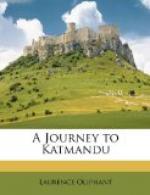I quite envied them the journey they were about to undertake, which would occupy them three weeks; the large droves of sheep by which they are always accompanied carried their limited worldly possessions, together with the various tokens of civilization which they had procured in the (to them) highly civilized country they were now visiting, and on which no doubt their Bhootan friends would look with no little awe and wonderment.
This wandering and singular race do not visit Nepaul solely to worship at the temple of Bhood, but have an eye to business as well as religion. I shall have occasion by and by to speak of the numerous articles which they import into Nepaul, on the backs of sheep, over the rocky passes which lead from the cold region they inhabit.
On our way from the temple of Bhood, which, by the by, had just been furbished up and whitewashed by a great man from H’Lassa, an emissary of the Grand Lama’s, we passed through the town of Katmandu, which was entered by a massive gateway, the city being surrounded by a wall. Long narrow streets, very fairly paved, lead in all directions; the houses are not so high as those of Benares or Cairo, the streets are broader, and some of them would admit of the passage of a carriage. They are all well drained and comparatively clean, contrasting most favourably in that respect with any other Oriental town I have ever seen. The streets were filled with foot-passengers, in bright and variegated costumes, passing busily on, or stopping to make purchases at the shops, which were on the ground-floor, with the whole front open, and the merchant sitting in the midst of his wares. The next story is inhabited, I believe, by his family; but I did not gain an entrance into any of the common houses. The outside front generally presented a mass of wood carving, each small window surrounded by a border two or three feet broad, while under the eaves of the house projected the singular balcony I have already described.
The great square, in which is situated the Durbar, or palace of the King, presented in itself almost all the characteristic features of a Nepaul town. As it suddenly burst upon us on turning the corner of the long street leading from the city-gate, the view was in every respect most striking. This square, or court, is well paved, and contains the Chinese pagoda, composed entirely of wood, from which it is a said the town derives its name. Its three or four roofs, glittering one above another, are supported by grotesque representations of unknown deities, and figures of all sizes and colours, not always of the most proper description. The whole formed a mass of green, gold leaf, and vermilion; and was guarded by a sentry, who, in order to be in keeping with his charge, wore a long flowing gown of bright colours, reaching to his ankles, and marched backwards and forwards at the top of a long flight of steps. A couple of well-carved lions, in grey sandstone,




